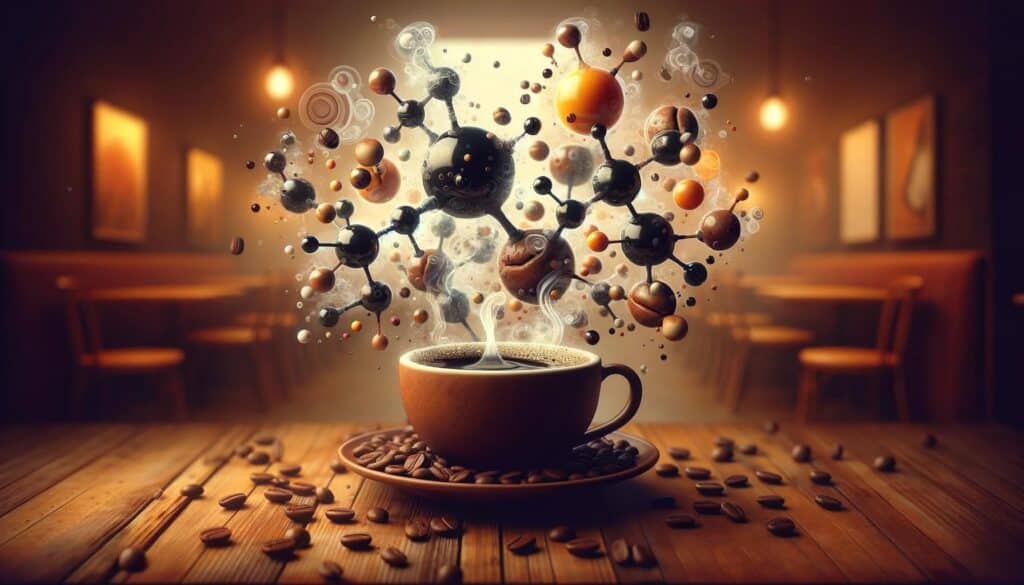Coffee, one of the most beloved beverages globally, has woven its way into the fabric of daily life in numerous cultures. As a staple in households and workplaces alike, it ranks as one of the world’s most consumed drinks. Statistics reveal that billions of cups of coffee are consumed daily, showcasing its immense popularity and integral role in social and economic spheres. The coffee industry drives significant economic activity, influencing everything from local agriculture to global trade markets.
Is Coffee Addictive?
Yes, coffee can be addictive for some people. The main addictive component in coffee is caffeine, a natural stimulant found in coffee beans. Caffeine can lead to physical dependence in regular users, evidenced by withdrawal symptoms such as headaches, irritability, fatigue, and depressed mood when they stop consuming it.
Despite its widespread acceptance and enjoyment, coffee often sparks debates regarding its health impacts, particularly concerning its addictive potential. Central to this discussion is caffeine, coffee’s primary active ingredient, known for its stimulating effects. The question of whether caffeine can lead to addiction is a contentious one, drawing input from various scientific, medical, and consumer perspectives. This article aims to explore the complex nature of caffeine addiction by examining how caffeine interacts with the body, reviewing scientific studies, and considering cultural attitudes towards coffee consumption. As we delve into this topic, we’ll seek to understand whether coffee’s grip on the hearts and minds of millions crosses into the realm of physiological dependency.
What is Coffee?

Description of Coffee: Origins and Processing
Coffee is a beverage derived from the roasted seeds, commonly referred to as beans, of the Coffea plant. This plant is native to tropical Africa, specifically countries like Ethiopia and Sudan, but has since spread to over 70 countries, primarily along the equatorial regions known as the Bean Belt. These countries include Brazil, Vietnam, Colombia, and Indonesia, which are among the top coffee producers globally.
The journey of coffee from plant to cup is both complex and labor-intensive. It begins with the planting of coffee trees, which take approximately 3 to 4 years to bear fruit. The fruits, known as coffee cherries, are typically handpicked in a labor-intensive process when they reach full ripeness, indicated by their bright red color. After harvesting, the cherries undergo processing to extract the beans, which can be done by either the dry method, where cherries are dried in the sun, or the wet method, which involves removing the pulp of the cherry to retrieve the bean.
Following extraction, the beans are fermented to remove the slimy layer of mucilage still adhering to them. They are then washed and dried to approximately 11% moisture content. The final steps involve roasting the beans, which is where they develop their distinctive color and flavor profile, and then grinding them before brewing the final coffee beverage.
Key Compounds in Coffee, Focusing on Caffeine
Coffee contains over a thousand chemical compounds that contribute to its flavor, aroma, and physiological effects. Among these, caffeine is the most prominent and significant in terms of its impact on the human body. Caffeine is a natural stimulant that affects the central nervous system, providing the well-known energy boost and increased alertness that coffee drinkers cherish.
However, coffee also contains other important compounds, including antioxidants such as chlorogenic acids, which have been linked to various health benefits. Diterpenes, another group of compounds found in coffee oils, are known to influence cholesterol levels, while trigonelline, which contributes to coffee’s aroma when roasted, also has antibacterial properties.
This rich composition makes coffee a subject of interest not only for its stimulating effects but also for its health implications, which vary depending on consumption patterns and individual metabolism.
Understanding Addiction

Definition of Addiction
Addiction is typically characterized as a chronic, relapsing disorder marked by compulsive drug seeking, continued use despite harmful consequences, and long-lasting changes in the brain. It is considered both a complex brain disorder and a mental illness. Addiction is about more than just physical dependence; it also encompasses behavioral control, craving, diminished recognition of significant problems with one’s behaviors and interpersonal relationships, and a dysfunctional emotional response.
General Criteria for Substance Addiction (DSM-5 Guidelines)
The Diagnostic and Statistical Manual of Mental Disorders, Fifth Edition (DSM-5), published by the American Psychiatric Association, outlines specific criteria for diagnosing substance use disorders, which can apply broadly to various substances, including caffeine, the active ingredient in coffee. These criteria are intended to help clinicians make accurate diagnoses and include the following key elements:
- Impaired Control:
- Using the substance in larger amounts or for longer than intended.
- Wanting to cut down or stop using the substance but not managing to.
- Spending a lot of time getting, using, or recovering from use of the substance.
- Cravings and urges to use the substance.
- Social Impairment:
- Continued substance use despite having persistent or recurrent social or interpersonal problems caused or exacerbated by the effects of its use.
- Important social, occupational, or recreational activities are given up or reduced because of substance use.
- Risky Use:
- Recurrent substance use in situations in which it is physically hazardous.
- Substance use is continued despite knowledge of having a persistent or recurrent physical or psychological problem that is likely to have been caused or exacerbated by the substance.
- Pharmacological Criteria:
- Tolerance, as defined by either a need for markedly increased amounts of the substance to achieve intoxication or desired effect, or a markedly diminished effect with continued use of the same amount of the substance.
- Withdrawal, manifested by either the characteristic withdrawal syndrome for the substance, or the substance (or a closely related substance) is taken to relieve or avoid withdrawal symptoms.
The presence of at least two of these criteria within a 12-month period may indicate a substance use disorder. The severity of the disorder can also be classified based on the number of criteria met: mild (2-3 criteria), moderate (4-5 criteria), and severe (6 or more criteria). This framework helps in understanding the extent and impact of addiction on an individual’s life, guiding appropriate treatment and management.
Caffeine: The Active Ingredient

Chemical Properties of Caffeine
Caffeine, scientifically known as 1,3,7-trimethylxanthine, is a bitter, crystalline alkaloid that belongs to a class of compounds called xanthines. It is naturally found in coffee beans, tea leaves, cocoa beans, and various other plants. Caffeine is highly soluble in water, which is why it is easily extracted into coffee and other beverages. It is stable under heat, making it resistant to the high temperatures involved in coffee brewing and roasting.
How Caffeine Affects the Brain and Body
Caffeine exerts its effects primarily by acting as a central nervous system stimulant. When consumed, it quickly absorbs into the bloodstream and begins affecting the body within as little as 15 minutes, with its peak levels occurring around one hour after consumption. The effects can last several hours, depending on the individual’s metabolism and tolerance.
Mechanism of Action
Caffeine’s primary mode of action in the human body is as an antagonist of adenosine receptors. Adenosine is a neurotransmitter that promotes relaxation and sleepiness by naturally slowing down nerve activity. Caffeine binds to the adenosine receptors without activating them, effectively blocking the calming effects of adenosine. This interference boosts neural activity and the release of other neurotransmitters like dopamine and norepinephrine, which enhance alertness, concentration, and energy levels.
Additionally, caffeine stimulates the release of adrenaline, which increases heart rate, releases sugar into the bloodstream for extra energy, and prepares the muscles for exertion — a response known as the “fight or flight” mechanism.
Comparison to Other Stimulants
While caffeine is a potent stimulant, its effects are generally milder compared to synthetic stimulants such as amphetamines or cocaine, which have a more pronounced impact on the central nervous system. These stronger stimulants can lead to more intense increases in dopamine and norepinephrine release, resulting in greater euphoria and, consequently, a higher potential for addiction and abuse. Unlike these substances, caffeine does not typically disrupt the brain’s reward system directly but can still lead to dependence due to its less intense, but still significant, stimulatory effects.
This comparison underlines why caffeine is considered generally safe for most people when consumed in moderation, even though it shares some mechanisms with more powerful stimulants. However, the potential for dependence and the side effects associated with high intake necessitate a cautious approach to its consumption.
Signs of Caffeine Addiction

Common Symptoms of Caffeine Dependence
Caffeine dependence can manifest in various ways, reflecting a habitual need for caffeine to function normally. While not as severe as addiction to substances like alcohol or narcotics, caffeine dependence can still pose challenges. Some common symptoms include:
- Increased Tolerance: Needing larger amounts of caffeine to feel its effects, which may lead individuals to consume more coffee, tea, or energy drinks over time.
- Inability to Cut Back: Persistent desire or unsuccessful efforts to cut down or control caffeine use.
- Withdrawal Symptoms: Experiencing unpleasant physical and psychological symptoms when not consuming caffeine.
Psychological and Physical Effects of Caffeine Withdrawal
When regular caffeine consumers suddenly stop their intake, they may experience a range of withdrawal symptoms, which can begin 12 to 24 hours after the last caffeine consumption and peak at roughly 20 to 51 hours. These symptoms can last from a few days to a week. Common withdrawal symptoms include:
- Headache: One of the most commonly reported symptoms, which can vary from mild to severe.
- Fatigue: Feelings of tiredness or drowsiness are typical as the body adjusts to the absence of caffeine’s stimulatory effect.
- Irritability: Reduced caffeine levels can affect mood, leading to feelings of irritability or general discontent.
- Difficulty Concentrating: Caffeine withdrawal can impair cognitive abilities, making it difficult to focus on tasks.
- Depressed Mood: Some individuals may experience mild depression due to the sudden drop in stimulation that caffeine typically provides.
- Flu-like Symptoms: Nausea, vomiting, muscle pain, and stiffness can also occur during the withdrawal phase.
Understanding these signs and symptoms of caffeine dependence and withdrawal can help individuals recognize potential issues with their caffeine consumption. For those who suspect they are experiencing dependence or withdrawal, gradually reducing caffeine intake rather than stopping abruptly can help mitigate symptoms. Consulting with a healthcare professional for guidance on managing caffeine consumption and dependence is also advisable.
Scientific Evidence on Caffeine Addiction

Overview of Key Studies and Their Findings
Numerous studies have investigated the effects of caffeine on the human body, focusing on both its benefits and potential for addiction. For instance, research has highlighted caffeine’s ability to enhance alertness, improve mood, and increase metabolism. However, studies have also pointed to the risks associated with withdrawal and dependency. A pivotal study by Johns Hopkins University concluded that caffeine can indeed lead to dependence, characterized by withdrawal symptoms and difficulty controlling consumption, although the degree of dependence is generally less severe compared to drugs like alcohol and nicotine.
Another line of research has shown that genetic factors may influence individual sensitivity to caffeine, affecting one’s risk of dependence. People with certain genetic makeups metabolize caffeine faster, reducing the likelihood of addiction, while slower metabolizers may experience more pronounced effects and a higher risk of dependency.
Caffeine’s Classification by Health Organizations (e.g., WHO, FDA)
The World Health Organization (WHO) recognizes caffeine dependence as a clinical disorder, categorizing it under “Mental and behavioural disorders due to use of other stimulants,” including caffeine. The U.S. Food and Drug Administration (FDA) considers caffeine to be both a drug and a food additive, regulated due to its effects on the central nervous system. The FDA also provides guidelines on moderate caffeine consumption, regarded as safe for most adults, which is generally defined as up to 400 milligrams per day – equivalent to about four or five cups of coffee.
Pros and Cons of Caffeine Consumption
Health Benefits of Moderate Coffee Consumption
Moderate coffee consumption is associated with several health benefits, including:
- Reduced Risk of Chronic Diseases: Numerous studies suggest that coffee consumption is linked to a reduced risk of diseases such as Parkinson’s, Alzheimer’s, type 2 diabetes, and certain forms of cancer.
- Antioxidant Properties: Coffee is a significant source of antioxidants, which help neutralize harmful free radicals in the body.
- Enhanced Mental Function: Caffeine can improve mood, reaction time, memory, and overall cognitive function.
Potential Risks Associated with High Caffeine Intake
While moderate caffeine intake can be beneficial, excessive consumption comes with risks:
- Increased Anxiety and Nervousness: High doses of caffeine can exacerbate anxiety symptoms and cause jitteriness and nervousness.
- Sleep Disturbances: Consuming caffeine late in the day can disrupt sleep patterns, leading to insomnia and reduced sleep quality.
- Cardiovascular Problems: Although rare, very high caffeine intake can lead to palpitations, increased heart rate, and elevated blood pressure.
- Dependency and Withdrawal: As discussed, high consumption can lead to physical dependence and uncomfortable withdrawal symptoms upon cessation.
Balancing caffeine consumption to harness its benefits while minimizing potential risks is crucial. For most individuals, moderate caffeine intake can be a safe and beneficial part of a daily routine, but staying informed and aware of one’s personal limits is key.
Expert Opinions

Insights from Health Professionals and Addiction Specialists
Health professionals and addiction specialists often share diverse viewpoints on caffeine’s addictive properties, reflecting the complexity of its effects on the human body.
1. Views Supporting Caffeine’s Addictive Nature:
- Many addiction specialists point out that caffeine meets several of the criteria for substance dependence outlined in the DSM-5, such as withdrawal symptoms and tolerance. Dr. Roland Griffiths, a professor at the Johns Hopkins School of Medicine, has extensively researched the effects of caffeine and asserts that withdrawal symptoms can be pronounced and severe, suggesting a form of addiction.
- Some psychiatrists and clinical psychologists observe that patients often report difficulty in reducing caffeine consumption, which interferes with their daily functioning or health, indicating a dependency similar to other addictive substances.
2. Contrary Views:
- Other experts argue that while caffeine may lead to some degree of physical dependence, it does not induce the compulsive drug-seeking behavior typically associated with more serious drugs like opioids or cocaine. Dr. Charles O’Brien, a professor specializing in psychiatry, emphasizes that caffeine does not threaten health in a manner comparable to true addictive substances, nor does it impair social or occupational functioning to the same degree.
- Some health professionals focus on the benefits of caffeine, suggesting that its positive effects on alertness and mood can enhance daily functioning and quality of life, which differentiates it from harmful addictions.
Should Caffeine Be Considered Truly Addictive
The debate over caffeine’s status as a genuinely addictive substance is ongoing among experts:
1. Pro-Addiction Stance:
- Supporters of classifying caffeine as addictive highlight the withdrawal and tolerance aspects. They note that some individuals experience significant distress and impairment in social, occupational, or other important areas of functioning due to caffeine withdrawal.
- This view is supported by anecdotal evidence and clinical studies that document the persistence and difficulty of quitting caffeine use among habitual consumers.
2. Against the Addiction Label:
- Critics argue that the term “addiction” might be too strong for caffeine dependency. They suggest that the effects of caffeine withdrawal are generally mild compared to substances like alcohol or nicotine and are typically short-lived.
- Furthermore, they point out that caffeine, when consumed responsibly, does not lead to the severe negative consequences seen with substances that are universally acknowledged as addictive. These experts often promote viewing caffeine use within the context of a balanced diet and lifestyle.
Ultimately, the classification of caffeine as addictive depends largely on one’s definition of addiction and the weight given to various aspects of its consumption and withdrawal. While there is consensus on the potential for dependence, the impact of caffeine is generally considered less severe than many other substances. This nuanced perspective is crucial in informing public health policies and individual decisions regarding caffeine consumption.
Conclusion
Summary of Key Points Discussed
The exploration of whether coffee, or more specifically caffeine, is addictive has uncovered a range of compelling insights:
- Chemical Nature: Caffeine, the active ingredient in coffee, is a central nervous system stimulant with a well-documented mechanism of action. It blocks adenosine receptors, which promotes alertness and can temporarily ward off drowsiness and fatigue.
- Addiction and Dependence: While caffeine can lead to physical dependence characterized by tolerance and withdrawal symptoms, experts differ on whether these symptoms are sufficient to classify caffeine as truly addictive compared to substances like alcohol or narcotics.
- Health Effects: Moderate coffee consumption can confer several health benefits, including a lower risk of several chronic diseases, improved mental function, and antioxidant benefits. However, excessive caffeine intake can lead to negative effects such as anxiety, sleep disturbances, and cardiovascular issues.
- Expert Opinions: Views among health professionals vary, with some acknowledging the addictive potential of caffeine due to its withdrawal symptoms and others cautioning against labeling it as addictive in a traditional sense because it does not typically lead to severe social or behavioral disruptions.
Final Thoughts on the Balance of Coffee’s Benefits and Risks
The question of caffeine’s addictive nature does not yield a straightforward answer. It behaves differently from more severe substances of abuse in that it does not commonly lead to the severe detrimental health, social, and economic consequences associated with traditional drugs of addiction. However, its ability to cause dependency and withdrawal symptoms cannot be ignored.
For most individuals, coffee can be a healthy part of their diet when consumed in moderation, offering more benefits than risks. The key is to be mindful of one’s own body’s responses to caffeine and to manage consumption to avoid the negative effects associated with high intake. Public health guidelines generally recommend up to 400 milligrams of caffeine per day, an amount considered safe for most adults but can vary based on individual sensitivity and health conditions.
In conclusion, while caffeine may exhibit some properties akin to addictive substances, its overall impact is less severe, and when consumed responsibly, it remains a valuable part of many people’s lives. This nuanced understanding helps individuals make informed decisions about their caffeine consumption and enjoy coffee’s many pleasures without undue concern.
FAQ: Coffee and Caffeine
- How much caffeine is in a cup of coffee?
- Answer: The amount of caffeine in a cup of coffee can vary significantly depending on the type of coffee bean, the brewing method, and the strength of the coffee. Generally, an average 8-ounce (240 ml) cup of coffee contains about 95 mg of caffeine, but this can range from 70 to 140 mg.
- Is it safe to drink coffee every day?
- Answer: Yes, for most people, moderate coffee consumption (about 3 to 4 cups per day) is considered safe and can even offer health benefits. However, excessive coffee consumption can lead to negative side effects, and individuals with certain health conditions should consume less.
- Can you become addicted to coffee?
- Answer: Coffee contains caffeine, which can lead to physical dependence and some withdrawal symptoms when intake is abruptly stopped. However, caffeine addiction is generally considered less severe than addiction to drugs like alcohol or nicotine.
- What are the symptoms of caffeine withdrawal?
- Answer: Common symptoms of caffeine withdrawal include headache, fatigue, irritability, difficulty concentrating, depressed mood, and flu-like symptoms such as nausea and muscle pain.
- How long does caffeine stay in your system?
- Answer: Caffeine has a half-life of about 3 to 5 hours, which means it takes this time for your body to eliminate half of the caffeine. However, its effects can last longer, depending on individual factors like metabolism.
- Can pregnant women drink coffee?
- Answer: Pregnant women are advised to limit their caffeine intake to about 200 mg per day, roughly equivalent to one 12-ounce cup of coffee. High caffeine intake during pregnancy can be linked to adverse pregnancy outcomes, so it’s best to consult a healthcare provider.
- Does coffee have health benefits?
- Answer: Yes, research suggests that moderate coffee consumption is linked to a reduced risk of several diseases, including Parkinson’s disease, type 2 diabetes, and certain types of cancer. Coffee is also a significant source of antioxidants.
- Can decaf coffee be a good alternative for reducing caffeine intake?
- Answer: Yes, decaffeinated coffee is an excellent option for those looking to reduce their caffeine intake while still enjoying the taste and social experience of coffee. Decaf coffee contains very little caffeine.
- Does caffeine affect blood pressure?
- Answer: Yes, caffeine can cause a short-term increase in blood pressure, although for most people, this effect diminishes with regular use. Individuals with hypertension or heart conditions should discuss their caffeine intake with a healthcare provider.
- How can I cut back on caffeine without experiencing withdrawal symptoms?
- Answer: To minimize withdrawal symptoms, reduce caffeine consumption gradually over several weeks. Decrease the amount you consume each day, or mix regular coffee with decaffeinated coffee to lower the caffeine content progressively.
References and Further Reading
- WebMD. (n.d.). Caffeine myths and facts. Retrieved from https://www.webmd.com/diet/caffeine-myths-and-facts
- Temple, J. L., Bernard, C., Lipshultz, S. E., Czachor, J. D., Westphal, J. A., & Mestre, M. A. (2013). The Safety of Ingested Caffeine: A Comprehensive Review. Frontiers in Psychiatry, 4, 58. https://www.ncbi.nlm.nih.gov/pmc/articles/PMC3777290/
- Addiction Center. (n.d.). Caffeine. Retrieved from https://www.addictioncenter.com/stimulants/caffeine/
- Johns Hopkins Medicine. (2020, December). New insight into caffeine use disorder. Retrieved from https://www.hopkinsmedicine.org/news/articles/2020/12/new-insight-into-caffeine-use-disorder






